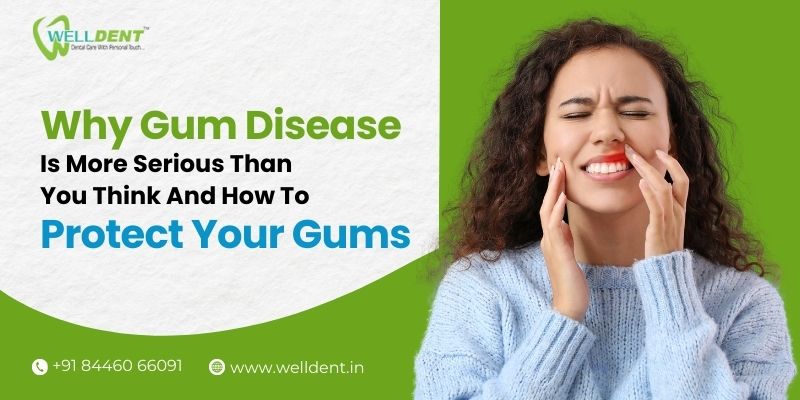Why Gum Disease is More Serious Than You Think and How to Protect Your Gums

Have you ever noticed a little blood when you brush or floss? It’s easy to shrug it off, thinking it’s no big deal. But what if that small sign is actually your gums waving a red flag? Gum disease isn’t just about bad breath or swollen gums—it can impact your overall health in ways you might not expect. Therefore consulting a dentist immediately and opting for a gum treatment is essential.
The Hidden Dangers of Gum Disease
Gum infection, also known as periodontal disease, starts as gingivitis—characterized by red, swollen gums that bleed easily. If ignored, it can advance into periodontitis, a severe infection that harms the soft tissue and bone supporting your teeth. But here’s where it gets even more serious:
- - Tooth Loss: Advanced gum disease can cause teeth to loosen and fall out, requiring expensive dental procedures to restore your smile.
- - Heart Disease Connection: Studies suggest a link between gum disease and heart problems. The inflammation from infected gums may contribute to clogged arteries and increase the risk of heart attacks.
- - Diabetes Complications: If you have diabetes, gum disease can make it more difficult to manage blood sugar levels, creating a dangerous cycle of health problems.
- - Respiratory Issues: The bacteria from affected gums can travel to the lungs, worsening conditions like pneumonia.
Clearly, gum disease isn’t just a dental issue—it’s a whole-body health risk!
How to Protect Your Gums and Keep Them Healthy
The good news? Gum disease is preventable and manageable with proper care. Here’s what you can do to protect your gums and overall health:
1. Brush Like a Pro
Brushing twice a day with fluoride toothpaste eliminates plaque and bacteria. Make sure to use a soft-bristled toothbrush and gentle circular motions—scrubbing too hard can actually harm your gums.
2. Floss Daily (Yes, It’s That Important!)
Brushing alone won’t reach the plaque hiding between your teeth. Flossing daily aids in clearing food particles and bacteria before they can cause damage.
3. Rinse with an Antibacterial Mouthwash
A good mouthwash can help destroy bacteria and reduce plaque buildup. Look for one that targets gingivitis and promotes gum health.
4. Eat for Healthy Gums
A diet rich in vitamins and minerals—especially vitamin C and calcium—supports gum health. Crunchy fruits and vegetables, like apples and carrots, can also help clean your teeth naturally.
5. Quit Smoking
Tobacco use is a major risk factor for gum disease. Quitting smoking can dramatically improve gum health and reduce the risk of severe infections.
6. Regular Dental Visits for Gum Treatment
Seeing your dentist regularly isn’t just about getting your teeth cleaned—it’s also about catching gum problems early. If your dentist detects indications of gum disease, they may recommend deep cleaning treatments like scaling and root planing to eliminate bacteria from the gumline.
Final Thoughts: Healthy Gums, Healthy You!
Gum disease is more severe than most people realize, but the good news is that it’s largely preventable with proper oral care. Paying attention to your gums today can save you from serious health issues down the road. So, take the time to brush, floss, eat well, and visit your dentist regularly. Your gums—and your entire body—will thank you!
If you’re already experiencing symptoms like bleeding gums, bad breath, or gum sensitivity, don’t wait! We at Welldent Family Dental Care offer professional gum treatment to stop the damage before it’s too late.
Your smile is worth the care—so start protecting it today!




